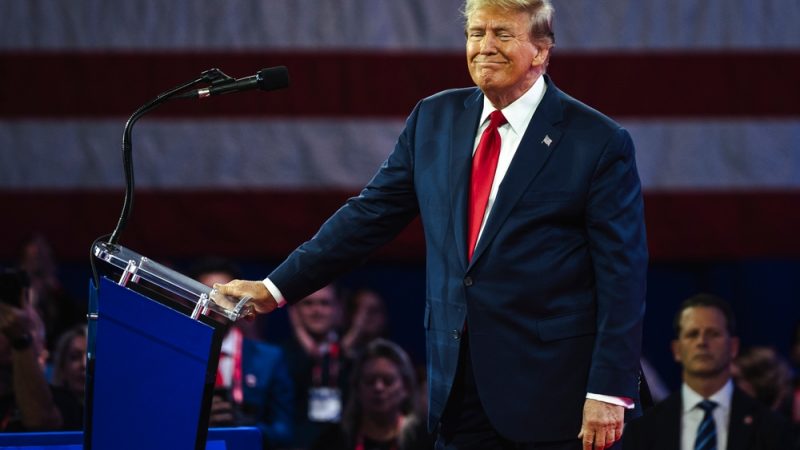
It’s all over for Kamala Harris. The task for the Vice President to overhaul the leads Donald Trump has built in the blue wall swing states of Pennsylvania, Michigan and Wisconsin is now too great.
The mood in the Democrat camp is despondent and Cedric Richmond, the party’s co-chair, has already announced to the remaining faithful gathered at Howard University in Washington DC that Harris will not be making any public comments until the morning.
When she does emerge, she will use the moment to concede the 2024 Presidential race to Donald Trump – and America, the UK and the rest of the world must now prepare for a second Trump administration, more organized, better prepared and more ruthless in its desire to reshape how the country is governed.
Backed by a Republican majority in the Senate (and possibly in the House too), it promises to be an administration that not only undermines much of the progress the US has made on social justice since the 1960s and one that undermines the basic democratic norms in place since the Second World War.
For the Democrats, the post mortem into how the party has so underperformed compared to 2020 has already begun.
They need to understand how Trump, a political pariah after he left office four years ago, can return to be the first Republican candidate to win the popular vote in the US for 20 years. How the can pick up support among communities like Latinos or Black men once the preserve of Democrats? How has the party of FDR, JFK and Bill Clinton lost the support of so many traditional blue-collar workers?
In the wake of Harris’s elevation to the Democrat candidacy after Joe Biden withdrew from the race she managed to generate huge support among activist Democrats. Yet, despite this, she still had a mountain to climb to win the White House.
This was always going to be an extremely difficult task for an incumbent candidate to win this election. The cost of living crisis, immigration and the international security situation created headwinds that any Democrat would have struggled.
Biden should have announced he was standing down at least six months before, too, to give the party an attempt to find the best candidate to take on Trump. Harris herself would have been a stronger pick if she had gone through such a process and had time to build a deeper connection with voters.
But these are relatively marginal factors. There is something deeper that needs addressing about the loss of connection with large swathes of the voting population. The uncomfortable truth is that Trump has more successfully tapped into people’s concerns than Biden or Harris over the last 18 months.
This is a problem not just for the Democrats in the US. Despite the landslide victory in July, Labour’s connections with traditional communities of support in the UK has also weakened. It’s an issue that the centre-left across the western world has yet to come to terms with.
This is a disastrous result for progressive politics across and Keir Starmer will carry the dented hopes of the centre-left across the western world for some years to come.
Starmer must also think through the consequences of dealing with a Trump White House. It will be a bumpy ride but the two have already met in New York in September and the Prime Minister will be hoping that he can build a strong personal relationship to help protect and promote Britain’s interests over the next four years.
It’s been a long night here in the US. The time for a deep rethink begins tomorrow.
‘How we win in the international age of right-wing populism’

In many ways what happened in this country on 4 July went against the international picture that sees right-wing populism’s appeal endure. A resurgent Labour Party, rooted in centre-left politics and with a manifesto for change, won a landslide and gave many people the hope for the first time in years that a different society, one that worked in the interests of ordinary people, was possible.
Certainly, none of us should be under any illusions about the challenges faced by the Labour government in dealing with the toxic legacy of 14 years of the Conservatives. We inherited public services that have been continually undermined, an economy that had been plagued by short-term thinking, and a political system scarred by the erosion of trust under characters like Boris Johnson.
This erosion of trust can also be seen in the US, where the popularity of Trump mirrors the heightened support we saw at the general election for the Reform party.
This is in part driven by people feeling that elected politicians and “the establishment” do not properly represent their interests and that society does not work in their favour anymore. As people look to who to blame, misinformation spreads, culture wars become inflamed, and attitudes towards immigrants harden.
The challenge for both Labour and the US Democrats is to remain relevant to these voters and to improve their lives in tangible, meaningful ways. Experience and history show us that a politics of protest does not cut through in the same way when people can see things are getting better.
We must deliver the real change that people are yearning for and which we promised to deliver. Without working people seeing a substantive improvement in their lives and a better future for their children, the simplistic slogans and ideas of the populist right will continue to flourish.
‘Challenge to Labour in 2029 will be holding off Reform and a populist Tory Party’
In my seat of Rochester and Strood, we fought a positive general election campaign based upon rebuilding public services and a commitment that Labour would put the interests of working people first. On the doorstep we heard many complaints that it was too difficult to get a GP appointment, that the roads were in a poor condition, and that crime and anti-social behaviour was going unpunished due to cuts in policing and council services.
In overturning a 17,000 Conservative majority, we succeeded in convincing many voters who had previously put their trust in the Tories and UKIP (who briefly held the seat from 2014-15) that the Labour Party had changed and could be trusted to deliver the change they wanted to see.
But while many switched to Labour, Reform gained just under 10,000 votes and finished a strong third, their populist slogans resonating with many voters. The challenge for Labour here, and in the eighty-nine seats where Reform finished second to Labour, will be holding off the threat of Reform and a resurgent populist Conservative Party under Kemi Badenoch.
‘We can stop the rise of populist by delivering on our manifesto’
In my view, the way that we stop the rise of the populist right is by delivering on our manifesto – simply doing what we said we would do, thereby making people’s daily lives easier and restoring a bit of trust and faith in politicians. And, as government finances improve over the course of the Parliament, tackling those deeper structural inequalities in our society like poverty and inequality that are unjust and hold people back.
As a new MP I am also acutely aware of the need to continually work at the local level, including working with unions, business, the voluntary sector, and community groups, to build a broad coalition of change.
The Budget last week was the first step in fixing the foundations of the country on which we can build a system that works for the many and not the few. By protecting the incomes of working people and committing to the pension triple lock, taking the first steps to fix our broken housing system, and supporting things that people care about most in their communities like the High Street and pubs, we have demonstrated that our priorities are well-aligned with most voters.
‘Sense that proceeds of success have not been shared fairly has given Trump a real opportunity’
As we wait to see which way critical voters in a small number of swing states in the US decide to vote, it is also worth remembering that statistics do not win elections. Despite the US economy experiencing consistent levels of growth in every quarter since 2021, a general sense that the proceeds of this success have not being shared fairly has given Trump a real opportunity to sit once again in the Oval Office.
At the next general election, we must both have delivered on our promises and crafted narratives and messages that tap into how people feel and what they aspire to do or be. British voters will give their verdict by asking themselves, “do I feel better off than I did in 2024?” We cannot afford to let them down.
No comments:
Post a Comment